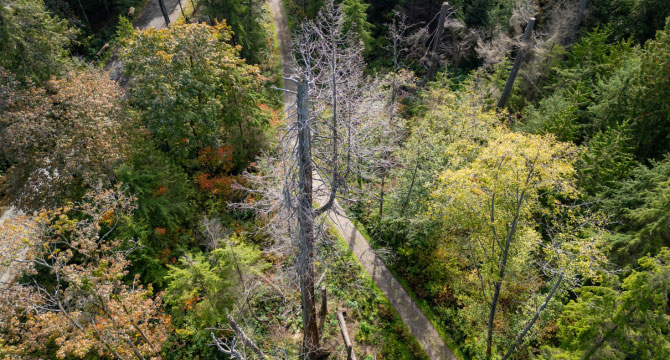
 Park Board approves next phase of work to mitigate public safety risks caused by hemlock looper in Stanley Park
Park Board approves next phase of work to mitigate public safety risks caused by hemlock looper in Stanley Park
Park Board Commissioners last night approved a detailed plan PDF file (177 KB) to address high-risk hemlock trees in Stanley Park killed by the hemlock looper. The hemlock looper insect experiences population outbreaks roughly every 15 years, however the most recent outbreak resulted in significant tree mortality in the park causing an elevated risk to public safety. The Phase II work approved by the Board will start in mid-October and will finish in early 2025, followed by replanting in spring 2025. Tree work will concentrate on areas heavily used by the public adjacent to the Aquarium, Brockton Point, Chickadee Trail and along the northwest seawall.
“Our response efforts in Stanley Park have been vital to ensuring the continuing safety and well-being of park users, park infrastructure and wildlife species in the park,” said Park Board Chair Brennan Bastyovanszky. “Further, it’s an opportunity to build a stronger Stanley Park that can better withstand future insect outbreaks and climate change impacts.”
Ecology: Past, present, future
Stanley Park’s forest has changed over time due to human impacts as well as natural disturbances such as major wind events. As a result, western hemlock has become over-represented leading to a less resilient forest.
“Legacy activities like logging, development, and the building of trails and roads have seen other species gradually removed and replaced with hemlock,” said Amit Gandha, Director of Parks. “Compared to other conifer species, western hemlocks are more susceptible to disease, windthrow, and stem breakage. Add to that, several years of drought and hard winters – and the trees in Stanley Park were more vulnerable to this insect outbreak and unlikely to recover.”
Work to date
The Stanley Park Hemlock Looper Impact and Wildfire Risk Assessment PDF file (4.2 MB) details the extent of the damage in which 160,000 of the approximately 600,000 trees in Stanley Park are dead or dying. Only a fraction of these impacted trees will need to be removed due to their risks to public safety.
During the first phase of emergency work from October 2023 to April 2024, less than 8,000 trees were removed in 25 per cent of the affected forest areas that posed the highest risks to public safety. This emergency response addressed the Stanley Park Causeway, Prospect Point, the Train precinct, Pipeline Road and sections along Stanley Park Drive. The work culminated with the planting of 25,000 native trees last spring.
Approximately half of the trees removed in the first phase were more than 20 centimetres in diameter and the remainder were smaller material. Eighty-eight per cent of the trees removed were western hemlock and 10 per cent were Douglas fir. No old growth trees were removed and all Douglas fir and western red cedar was shared with the Host Nations for ceremonial use. In addition, some logs were provided to the Vancouver Police Department to support the On the Land Cultural Training Program External website, opens in new tab. The remaining commercially viable hemlock material was taken to a domestic log sort in Squamish, while other materials were left in place in the forest to provide coarse woody debris for habitat. More on phase I can be found on the project webpage.
Added Bastyovanszky: “We acknowledge that the park is a treasured space and there will be impacts for park users and the public over the coming months. Staff have worked closely with stakeholders and the community to reduce impacts as much as possible while prioritizing safety. We are immensely thankful for the public’s patience.”
Traffic impacts
- Work will start in mid-October near the Chickadee Trail with estimated duration of four weeks
- A section of Pipeline Road (north of the wooden bridge) will be closed to the public
- Watch for signage and signals from onsite traffic management for vehicles, pedestrians and cyclists
- Ongoing project impacts will be shared via X External website, opens in new tab, Facebook External website, opens in new tab and vancouver.ca/stanley-park-trees